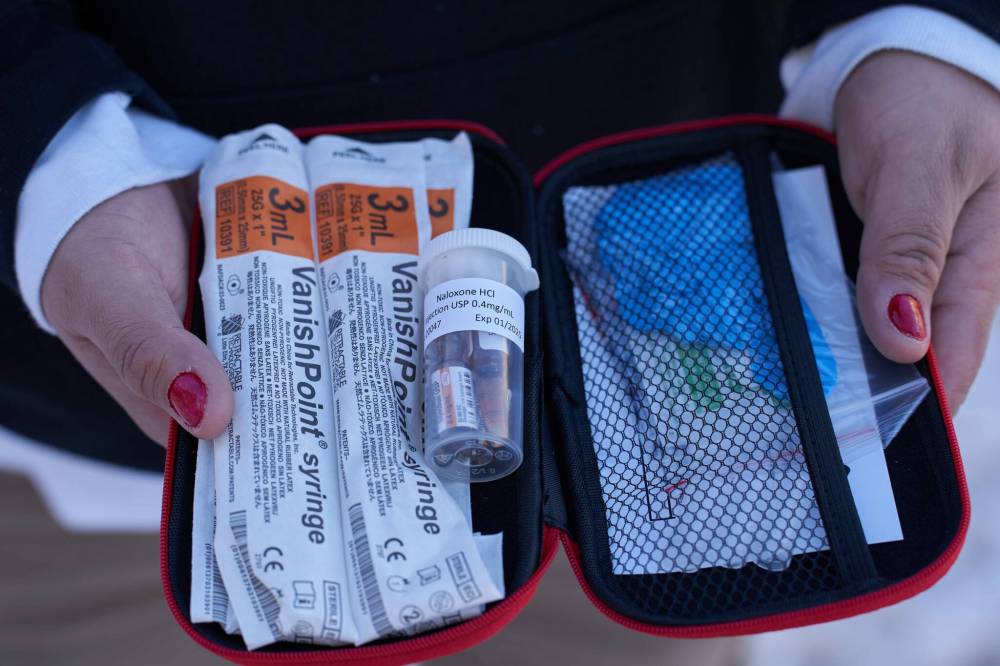City workers saving lives with naloxone doses
Advertisement
Read this article for free:
or
Already have an account? Log in here »
To continue reading, please subscribe:
Monthly Digital Subscription
$0 for the first 4 weeks*
- Enjoy unlimited reading on winnipegfreepress.com
- Read the E-Edition, our digital replica newspaper
- Access News Break, our award-winning app
- Play interactive puzzles
*No charge for 4 weeks then price increases to the regular rate of $19.00 plus GST every four weeks. Offer available to new and qualified returning subscribers only. Cancel any time.
Monthly Digital Subscription
$4.75/week*
- Enjoy unlimited reading on winnipegfreepress.com
- Read the E-Edition, our digital replica newspaper
- Access News Break, our award-winning app
- Play interactive puzzles
*Billed as $19 plus GST every four weeks. Cancel any time.
To continue reading, please subscribe:
Add Free Press access to your Brandon Sun subscription for only an additional
$1 for the first 4 weeks*
*Your next subscription payment will increase by $1.00 and you will be charged $16.99 plus GST for four weeks. After four weeks, your payment will increase to $23.99 plus GST every four weeks.
Read unlimited articles for free today:
or
Already have an account? Log in here »
Hey there, time traveller!
This article was published 29/09/2023 (784 days ago), so information in it may no longer be current.
A program that trains City of Winnipeg staff to administer naloxone to people experiencing suspected drug overdoses appears to be paying life-saving dividends.
The anti-opioid medication has been provided at least six times by staff at city facilities between April and August, according to data provided to the Free Press.
The number includes two doses at the Fort Rouge Leisure Centre, one at Millennium Library, two at St. John’s Library, and one at St. James-Assiniboia Library.

DAVID LIPNOWSKI / WINNIPEG FREE PRESS FILES
Naloxone can temporarily reverse the effects of opioid overdoses and restore breathing within two to five minutes.
“When it comes to any overdose that’s involving a drug like fentanyl, we know seconds matter and it’s not a secret it can take the paramedics a number of minutes to arrive on scene,” Cory Guest, a public education co-ordinator with the Winnipeg Fire Paramedic Service, said in an interview.
“(Through this training) city staff could do something to hopefully revive the patient enough where they start to breathe prior to us getting there.”
The program, in place since January, was established in response to public health concerns about opioids. Employees at city recreation and leisure centres, indoor pools, fitness centres and libraries were trained to administer naloxone nasal spray.
The fast-acting drug can temporarily reverse the effects of opioid overdoses and restore breathing within two to five minutes, which can provide more time for emergency services to arrive, the city has noted.
Guest said the city did not expect to be inundated with a huge number of suspected overdoses at public buildings. He deemed the project a success, since it helped several people at risk of dying due to overdose.
He noted staff also received training on the trauma frequently linked to drug use, which was meant to help ensure a compassionate response to people in crisis.
Guest said the availability of naloxone is important, since the increased substance use continues to place a heavy demand on WFPS resources.
“The toxicity and the lethality of the drugs we’re seeing does continue to increase,” he said.
According to city data, since August 2022, at least seven additional doses of naloxone were administered by staff who are either contracted by the city or not regularly posted at those public facilities.
That included six doses at Millennium Library given by members of the Downtown Community Safety Partnership, Winnipeg Police Service, WFPS, security guards or community safety hosts. One dose was administered by a community safety host at the Cornish Library.
The WFPS gave out 2,018 doses of naloxone in 2019, 3,786 in 2020, 4,071 in 2021, 3,631 in 2022, and 3,733 in 2023 (to date), according to information posted in the City of Winnipeg’s open data portal.
Coun. Sherri Rollins, who has championed calls for a safer drug supply and other steps to prevent overdose deaths, said it’s encouraging to see municipal staff make use of naloxone doses, as illicit drug use continues to pose a significant public health threat.
“It’s at our facilities because, unfortunately, we’re in a drug-poisoning crisis and the reality is people need naloxone kits to save lives and they are saving lives. Insofar that it’s saving lives, that’s a good thing. Insofar as there continues to be drug poisoning that necessitates naloxone… I continue to grieve with families in the city… when unfortunately, folks can’t be revived,” said Rollins.
joyanne.pursaga@freepress.mb.ca
Twitter: @joyanne_pursaga

Joyanne is city hall reporter for the Winnipeg Free Press. A reporter since 2004, she began covering politics exclusively in 2012, writing on city hall and the Manitoba Legislature for the Winnipeg Sun before joining the Free Press in early 2020. Read more about Joyanne.
Every piece of reporting Joyanne produces is reviewed by an editing team before it is posted online or published in print — part of the Free Press‘s tradition, since 1872, of producing reliable independent journalism. Read more about Free Press’s history and mandate, and learn how our newsroom operates.
Our newsroom depends on a growing audience of readers to power our journalism. If you are not a paid reader, please consider becoming a subscriber.
Our newsroom depends on its audience of readers to power our journalism. Thank you for your support.


